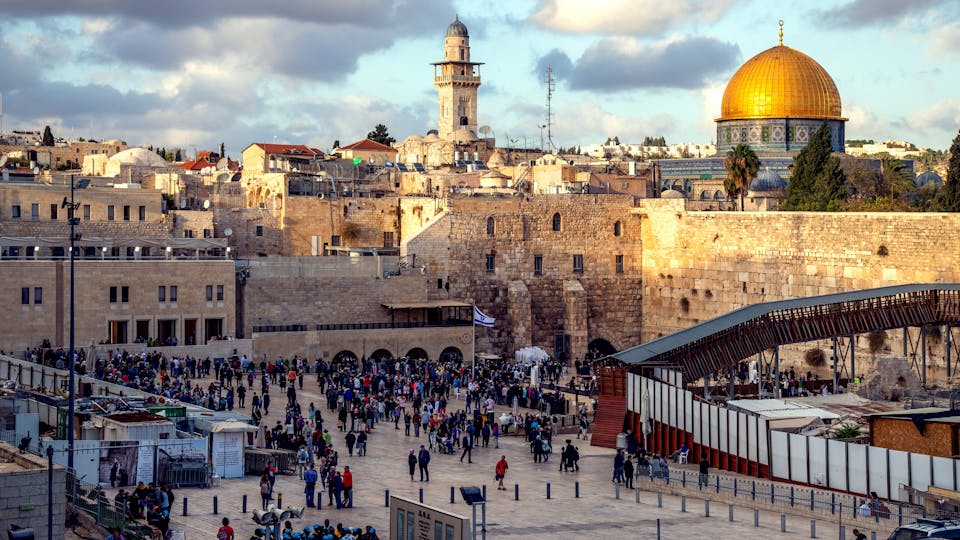A Day To Atone

None can fulfill the law of innocence; therefore none are exempt from the law of repentance.
Soon, tens of thousands of Jewish worshippers will be gathered by the Western Wall in Jerusalem for the midnight “Forgiveness Prayers” as the Day of Atonement settles upon Israel like a weighty blanket of introspection, repentance, contrition, petition, and unwavering faith in a merciful God who forgives our sins.
Of the seven Feasts of the Lord that tell the story of God’s redemption, the Day of Atonement is the fifth feast, and the Bible tells us that “… the tenth day of this seventh month shall be the Day of Atonement. It shall be a holy convocation for you; you shall afflict your souls, and offer an offering made by fire to the LORD.” (Leviticus 23:27). The nation of Israel is about to enter the most solemn day on its annual calendar, and the gravity of this special time echoes among people of faith all over the world.
The issue of SIN and man’s need for ATONEMENT is unique to the Judeo-Christian faith.
No other faith or ideology addresses the reality of sin with such seriousness, and none offers an acceptable solution. In fact, sin, sacrifice, forgiveness, and restoration are key themes throughout the entire Bible starting with man’s expulsion from the Garden of Eden in the Book of Genesis to the Slain Lamb of God, the ultimate sacrifice standing in the heart of heaven in the Book of Revelation.
While forgiveness of sin is necessary in order to secure a restoration of relationships, forgiveness is not cheap. According to God’s word, a price has to be paid and restitution must be made in order to undo the offense and satisfy the debt. The problem is, how can man “pay” God for a moral failure against His perfect nature and standards? How can a fallen and compromised creature offer anything of value to the holy and eternal Creator?
Confronting the pagan practices around him, the prophet Micah expressed this very dilemma long ago saying, “With what shall I come before the LORD, and bow myself before the High God? Shall I come before Him with burnt offerings, with calves a year old? Will the LORD be pleased with thousands of rams, ten thousand rivers of oil? Shall I give my firstborn for my transgression, the fruit of my body for the sin of my soul?” (Micah 6:6-7). In other words, no gift, no sacrifice, not even offering a human life is sufficient to undo man’s guilt before our Creator. There must be an answer; but what?

The Day of Atonement is the answer. It is God’s annual reminder that our need is real and that a genuine and lasting solution will come. One day a year, on the tenth day of the seventh month of the Hebraic calendar, the nation of Israel was commanded to observe a total Sabbath rest and afflict their souls by denying the appetites of the body as a token of repentance.
Why? Because none can fulfill the law of innocence, therefore none are exempt from the law of repentance and atonement.
While the entire nation of Israel was in a total mandatory Sabbath rest afflicting their souls, only the High Priest worked. Aaron (and all High Priests after him) selected one goat for the Lord’s sacrifice and a second one to be the "Azazel." The Azazel goat had the sins of the entire nation placed on its head and was sent into the wilderness to perish, guilty and condemned, carrying with it the nation’s sin burden.
The other goat was slaughtered as a sin offering and its blood was taken by the High Priest into the Holy of Holies to be sprinkled on the mercy seat of the Ark of the Covenant of God. Atonement was secured for the offenses of the entire nation for that entire year. And the same for the next year… and the next… and the next. Will there ever be a sacrifice sufficient to end this cycle of sin, condemnation, and atonement once and for all?
While the English word “atonement” occurs more than 80 times in the Bible, its Hebrew root word, KOFER (כֹּפֶר) appears only 17 times, with the first appearance in Genesis 6:14 where God commanded Noah to build an Ark. “Make yourself an Ark of gopherwood; make rooms in the Ark, and cover (KOFER) it inside and outside with pitch.” The word KOFER in this context means to cover over, to expiate, and to soothe. In its broader context, it also means to appease, to forgive, and to atone for.
In this “first atonement,” Noah “covered over” the rough wooden planks of the Ark with pitch (a form of tar) to bind the boards together, seal, and waterproof them. Likewise, the atonement of God covers us, binds us together as a community of faith, makes us “leak-proof,” puts away our many flaws, and enables us to safely float over whatever flood covers the earth.
What Israel seeks to find each year at the Day of Atonement, God, in His love and mercy, has already provided in the offering of His Messiah as the only perfect, acceptable, and everlasting sacrifice who alone can untangle the dilemma of sin and reconcile us to our Heavenly Father once and for all.
Prophetically, The Day of Atonement points to the blessed day when, as the Apostle Paul foresaw, “All Israel shall be saved.” Israel’s prophets promised that a day will come when the eyes of the people of Israel will be opened to recognize God’s great provision and that the entire nation will be consumed with heart-rending repentance and revival. S
eeing this day from a distance, the prophet Zechariah said, “… And I will pour on the house of David and on the inhabitants of Jerusalem the Spirit of grace and supplication; then they will look on Me whom they pierced. Yes, they will mourn for Him as one mourns for his only son, and grieve for Him as one grieves for a firstborn... In that day a fountain shall be opened for the house of David and for the inhabitants of Jerusalem, for sin and for uncleanness…” (Zechariah 12:10 & 13:1).
In expectation for this great and final Day of Atonement, we wish all of our friends around the world a blessed Day of Atonement.
Your Sar-El team